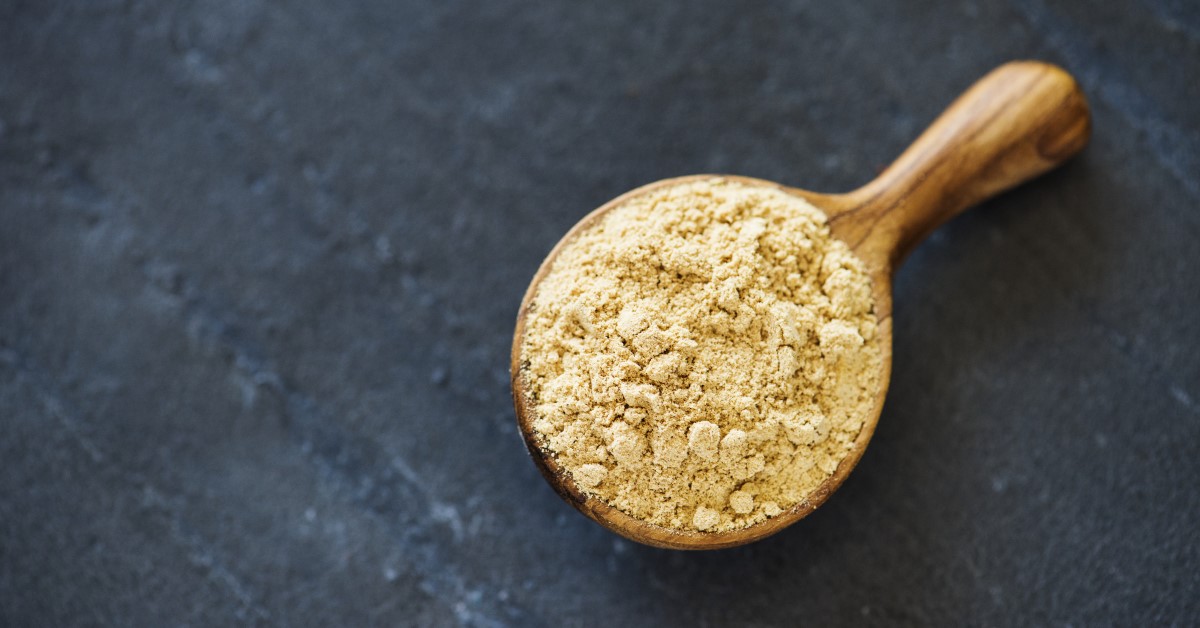Is Nutritional Yeast Good for Cats?
Nutritional yeast can be a healthy supplement for cats and can encourage picky eaters to finish their meals.

Cats require a complete and balanced diet that consists of minimal amounts of carbohydrates, moderate amounts of fat, and high amounts of protein from sources such as chicken, turkey, and beef. However, some felines tend to be picky eaters, which means they may not consume adequate amounts of certain vitamins and minerals. Supplements like nutritional yeast can help fill nutritional gaps and provide other key health benefits.
What Is Nutritional Yeast?
Nutritional yeast is made from yeast cultures that are deactivated and dried to create small flakes or granules. The yeast has a fermented, rich cheesy flavor that many cats enjoy when sprinkled over their food. The wholesome ingredient is made by fermenting live Saccharomyces cerevisiae yeast before heating, drying, and fortifying it with B vitamins and folic acid. It is considered a healthy vitamin and protein supplement but should not be relied upon to provide your cat with total nutrition.
It is important to understand that nutritional yeast is different from baker’s yeast and brewer’s yeast. While all three types of yeast are derived from Saccharomyces cerevisiae, baker’s yeast and brewer’s yeast are sold with live cultures that aid in beer brewing or leavening bread. In comparison, the live cultures found in nutritional yeast are killed during the pasteurization process, which is also what helps give it its tasty, savory flavor.
What are the Types of Nutritional Yeast?
When buying nutritional yeast, you’ll likely encounter a wide range of brands and varieties. Nutritional yeast is often sold in the form of granules, powder, or thin flakes. You may also discover this supplement in the spice or condiment section of your local supermarket. However, the type of nutritional yeast you purchase is one of the most important factors to consider. There are two types of nutritional yeast:
- Unfortified Nutritional Yeast: This type of nutritional yeast contains no added nutrients. Instead, it only has vitamins and minerals that are produced naturally as the yeast cells grow.
- Fortified Nutritional Yeast: This type of nutritional yeast contains added synthetic vitamins and minerals that are incorporated into the yeast during the manufacturing process to increase its nutrient content. You’ll find these added nutrients in the product’s ingredient list.
If possible, choose fortified nutritional yeast for your cat as it contains the highest amount of nutrients and will deliver the best benefits to your cat. Ensure that the product you choose is low in calories and sodium, and is sugar-free, fat-free, gluten-free, and vegan.
How Is Nutritional Yeast Good for Cats?
Nutritional yeast can be safely introduced into a cat’s diet. It is an excellent source of vitamins and protein and is relatively low in fat. It has also been found to strengthen the immune system, promote skin and coat health, and give your cat an energy boost. When served in combination with regular meals, nutritional yeast can also help your pet feel full for longer which can cut down on snacking and lower your cat’s risk of obesity.
If you have a picky eater, nutritional yeast can be a great way to encourage your cat to eat. Sprinkle a quarter teaspoon of nutritional yeast over your cat’s meals and the savory aroma is sure to lure in your pet. The amount of nutritional yeast you should feed a cat can vary depending on several factors, such as your pet’s age, weight, and dietary restrictions. Always consult a vet before giving your cat any new supplement.
Are There Side Effects of Nutritional Yeast?
While side effects from consuming nutritional yeast are rare, there are some instances in which a cat may experience a negative reaction. Possible side effects of nutritional yeast in cats include increased amounts of uric acid in the urine, resulting in possible kidney disease in the long term. Some cats may also develop skin rashes. It is important to look for signs that your cat may be allergic to nutritional yeast, such as itchiness, hair loss, diarrhea, and vomiting.
How Often Can You Feed Cats Nutritional Yeast?
Like with any food or supplement, too much of a good thing can have negative consequences. Too much nutritional yeast could possibly harm your cat, causing adverse side effects. For example, an overabundance of nutritional yeast could accelerate the onset of kidney disease in cats due to its high phosphorus content. Knowing how much and how often to feed your cat nutritional yeast is essential to help your cat maintain good health and wellness.
According to Dr. Lynn Bahr of “Ask the Cat Dog with Dr. Lynn Bahr,” it is important to offer your cat nutritional yeast that is GMO-free and safely processed. Poor quality products could cause harm to your pet. In addition, Dr. Bahr suggests not feeding your cat nutritional yeast every day, but it can be a great supplement to offer cats regularly, especially when a cat seems to receive benefits from the supplement.
Supplementing Your Cat’s Diet with Nutritional Yeast
Nutritional yeast is a popular food product that offers both humans and pets many health benefits due to its impressive nutritional content. However, it’s important to use caution when feeding your cat any new supplement. Consult with your vet about the type and dosage of nutritional yeast before starting your cat on a new regimen. Also, discontinue giving your pet nutritional yeast if they start to show any adverse side effects or possible allergies.
Ready to start saving money on pet wellness care?
Then take a look at Mint Wellness, the pet wellness plan that provides fast reimbursement on routine pet care. Save on vaccinations, wellness exams, preventatives, dental, and more!
Learn More


